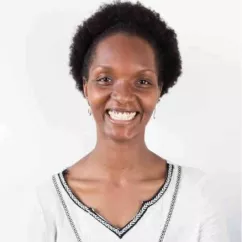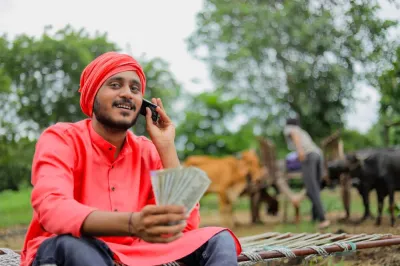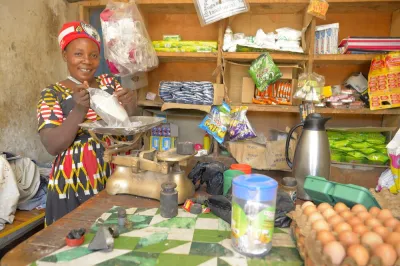Investing in Gender Diversity and Women’s Leadership

Adama Bah is Social Performance Analyst at Oikocredit. She is responsible for generating insights to enhance the performance of Oikocredit as a social impact investor. She also develops tools to increase the effectiveness of Oikocredit’s social and environmental performance management. Adama has been working for 15 years on issues related to social inclusion and sustainable development in Africa, Asia and Latin America.
FinDev Gateway: As a social investor, Oikocredit is guided by the principle of empowering people to improve their livelihoods. How do you do this?
Adama Bah: Oikocredit is a worldwide cooperative established in 1975. We provide credit, equity and capacity building to selected partner organizations working in financial inclusion, agriculture and renewable energy in support of low-income people. Currently we partner with more than 350 financial service providers in Africa, Asia and Latin America & the Caribbean. Our work contributes to the United Nations Sustainable Development Goals (SDGs), especially to SDG 5 –gender equality and the empowerment of women and girls – because so many of our partners prioritize serving women clients.
Advancing women's leadership in partner organizations
FinDev: How do you work with these partners to advance gender diversity and women’s leadership?
Adama Bah: Since 2010, we have been evaluating partner organizations on women’s participation and leadership as part of our regular assessment and monitoring. Including gender indicators allows us to have this topic as a standard part of our conversations with partners and to measure change.
We have also adopted a gender lens for several capacity building projects aimed at supporting our partners to develop enhanced products tailored to their clients’ financial needs. In the Philippines, for example, the Bridging the Gender Gap in Responsible Finance project provided training for MFI staff and clients to increase awareness of gender imbalances in the family as a way to enable economic empowerment. In Ghana, we partner with Plan International Canada and Plan Ghana on the Women’s Innovation for Sustainable Enterprises (WISE) project, which aims to shift attitudes about gender roles and support women entrepreneurs. Through this project, we are working with five organizations on becoming more gender-responsive, in particular in developing financial products that are gender sensitive and address the needs of women entrepreneurs.
Making the case for gender diversity
FinDev: Do you find you have to make the case for increasing women’s leadership and gender diversity in your partner FSPs? If so, how do you go about it?
Adama: Some Oikocredit partners fully understand the importance of women’s leadership and gender diversity, whereas others may need convincing. When appropriate, we aim to increase awareness of the value of diversity within the leadership of financial service providers (or any organization, for that matter). We can draw, for example, on sound research that shows the positive effects of gender diversity in terms of financial and commercial performance. Women’s leadership helps make organizations more client-centric, reduces portfolio risk and improves staff productivity and retention, among other effects.
In my opinion, it would also be useful to make partners aware of the need for a gender-sensitive approach to uncover unconscious biases and their manifestations, as it can help move the needle on gender diversity at the workplace and especially at leadership level.
FinDev: For the FSPs that you work with, what have you found to be the biggest stumbling blocks in moving the needle on gender diversity and women’s leadership?
Adama: Based on what we hear from some of our partners, which is corroborated by research, the main challenge arises from social norms and expectations about women’s and men’s roles in societies, communities and families. The expectation is that women should take care of family members and that men should provide for them. Managing work-life balance is often made the sole responsibility of women, rather than an issue tackled jointly at the household level. Therefore, access to good quality childcare is generally a key factor in enabling women’s participation in economic and social activities at all levels.
From the perspective of human resources, there is a mix of challenges, such as the lack of role models, the need to combine reproductive and professional roles (while being expected to prioritize the former due to the social norms I mentioned above), coping with “imposter” feelings, and organizations tending to place more value on traditionally masculine characteristics when it comes to performance appraisals. These factors are likely to go unnoticed in gender-blind organizations, which may still continue with the idea that they enable equality between men and women. Women’s recruitment, retention and promotion are thus key in advancing women’s leadership.
Learning from gender-aware and innovative organizations
FinDev: As you work in over 50 countries, have you noticed any trends among different regions as to their strengths and areas that need work?
Adama: Regarding gender diversity in leadership, analysis of our portfolio shows that, on average, microfinance partners that are cooperatives or NGOs located in Latin America, and that serve fewer than 10,000 clients, tend to have more women in their leadership than other partners. Nevertheless, within each region or country, there are organizations that are more innovative and advanced in terms of gender diversity and others that lag behind. Within Oikocredit’s network, going forward, we have the opportunity to share knowledge, resources and good practices based on the experience of the more gender-aware and innovative organizations.


